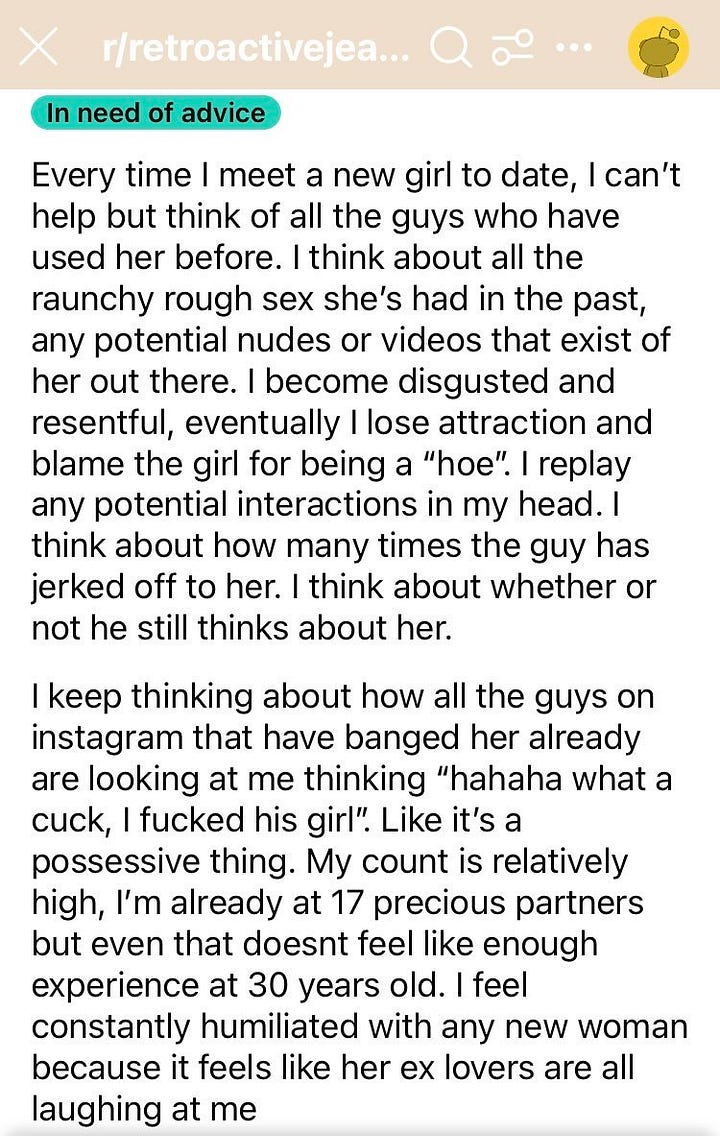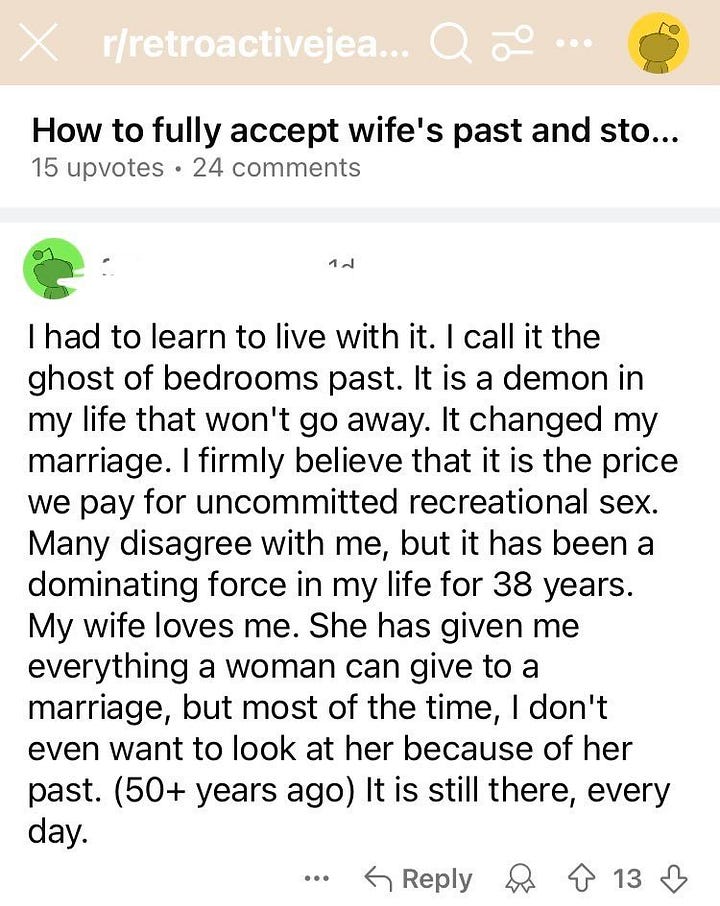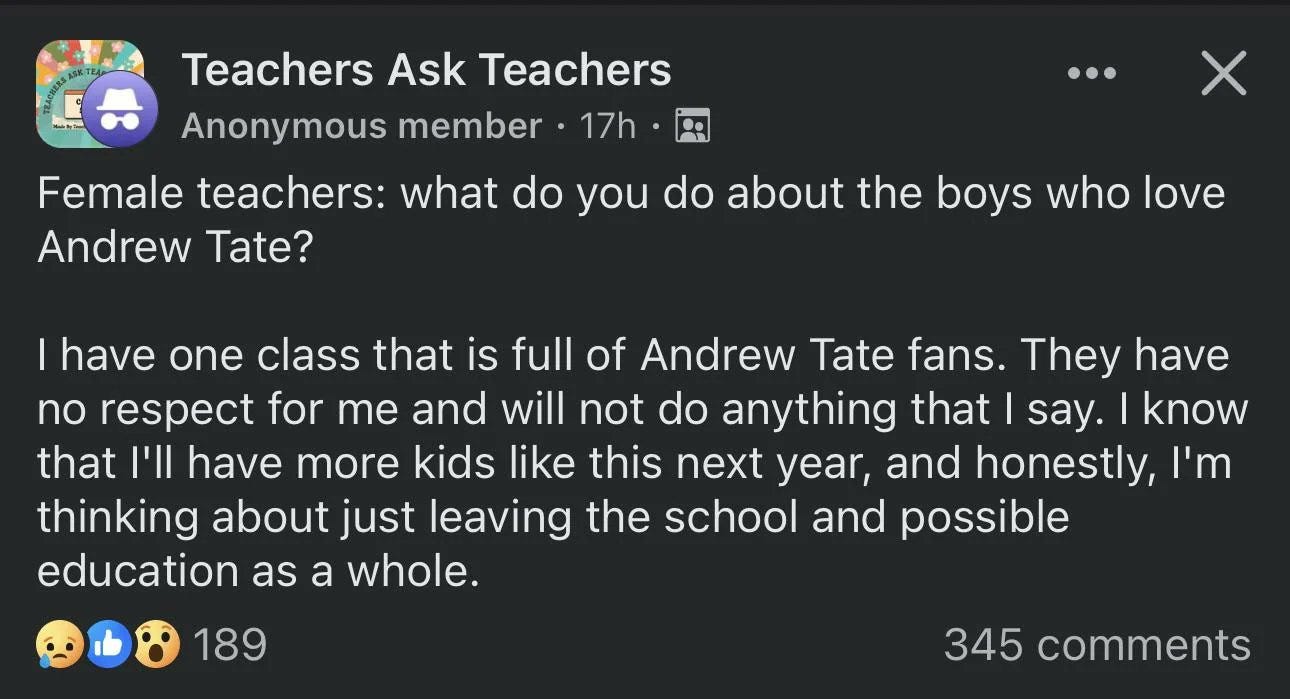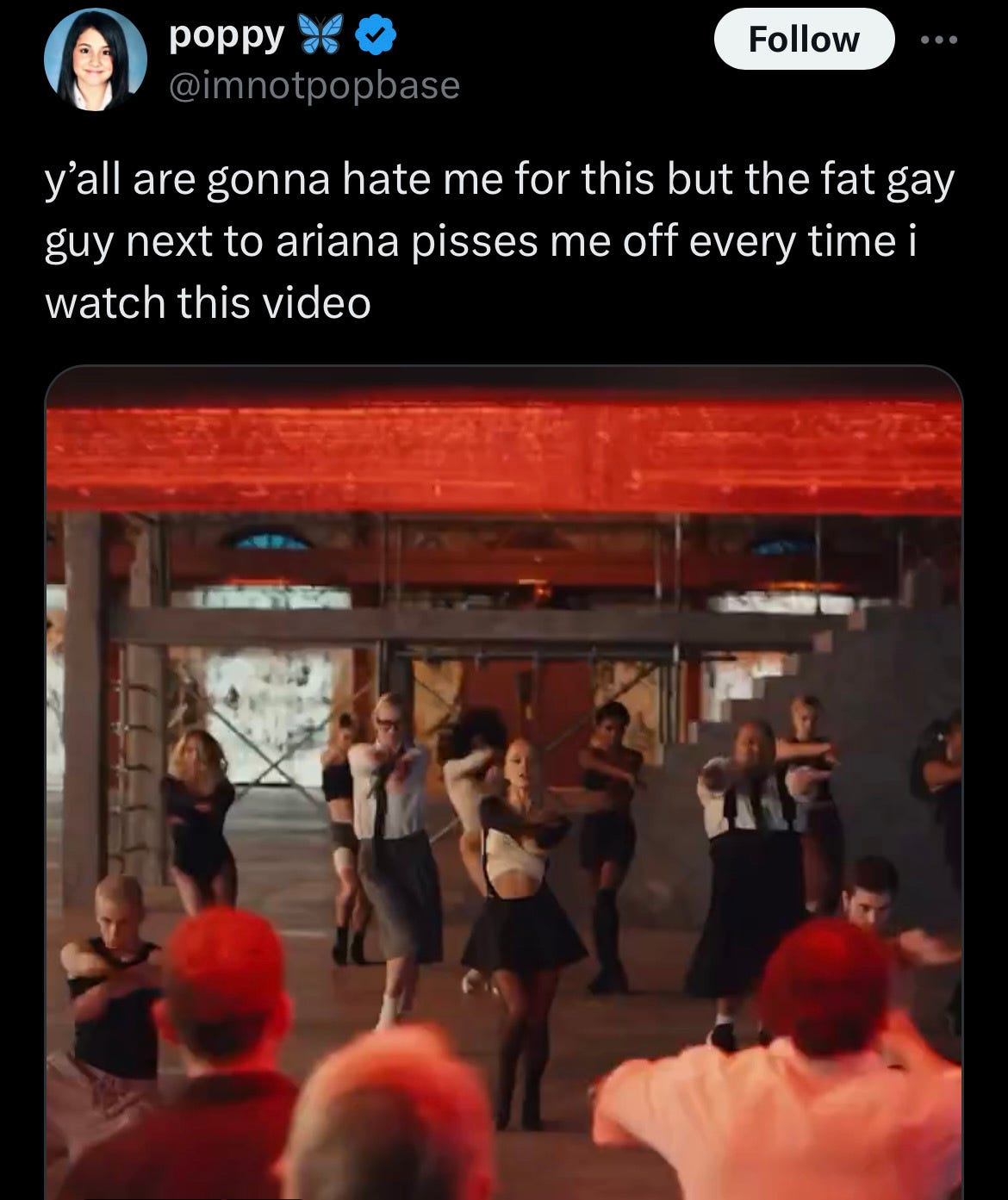The Year Losers Won
If 2023 was the year of the victim, 2024 was the year of the loser
This year, I noticed myself beating a few drums time and time again. I feel like the infamous old man yelling at cloud meme: I’ve spent so much of my time online watching people become crueler, meaner, more shiftless. It’s easy to think that the discourse around people getting more conservative, men being radicalized, and Gen Z becoming prudish is overblown, but the thing about the internet is that these are real people tweeting, posting, and discussing their real beliefs.
The internet might be an echo chamber but it has ramifications in real life. The people who would normally be shunned for being odd, angry, maladjusted or misanthropic won everything this year. See: the election. See: teachers discussing how young male students are parroting redpill/manosphere propaganda at ten years old.
The veil has officially lifted, and all the darkest parts of the internet (rageful incels screaming “your body my choice”, the gleeful hurling of slurs, the return of the r-word and f-word, Gen Z fully doing race science on “X” and TikTok) have seeped into popular discourse. There is no separation between what’s happening online and what’s going on outside: this is the world now.
A Site of Societal Collapse
I knew something was deeply amiss in September when cashier discourse spilled out across all corners of the internet. It began when a TikToker asked why cashiers didn’t say hello in stores anymore. Multiple Black Tiktokers jumped in to agree that it didn’t make sense, and I did the same: I worked retail all throughout college. The consensus seemed to be “it’s polite to say hello when there is a human being standing in front of you”. Before long, the tides turned. Younger folks started saying it was their god given right to not say hello to people. The conversation then somehow became “forcing me to say hello to customers is violence and creating hostile environments is anticapitalist praxis”.
This didn’t surprise me. Two years ago, I made a video about splitting the bill etiquette where I talked about how more and more, we’re letting people who would normally be shunned control discourse. It doesn’t surprise me that there is a loneliness crisis in this country while people who are actively misanthropic scream on the internet about how they refuse to say hello to people, refuse to drive their friends to airports or help them move, refuse to hold space for difficult conversations or participate in any behavior that could inconvenience them or take them out of their comfort zones. “You don’t owe anyone anything” began as a self-help slogan ten years ago and slowly became the rallying cry for miserable people justifying their lack of community.
The second part of this— framing misanthropy in academic jargon— has bothered me for years. On TikTok, I called it a failing of sociology-speak, and I finally realized why it bugged me so much. These concepts were created by academics to discuss serious issues in society: white privilege, anti-racism, the dismantling of capitalism, etc. were all originally meant to be used by people doing work to educate others or combat these pillars of American society. I watched as they proliferated across Tumblr and became watered down, leading to “no members of marginalized communities are ever allowed to be criticized” and Instagram infographics = activism.
The concepts that were originally used to liberate us have become prisons, and fifteen years in, where are we? Our terms have been either watered down to the point of parody or completely co-opted by conservatives (see: DEI and woke becoming slurs).
It is not anti-capitalist to be rude to customers. You are not destroying capitalism by not saying hello to people at a suburban Kohl’s outside Cincinnati. There is no nuance online, but there has to be a middle ground between “I am a Communist because I didn’t say hello to someone at a coffee shop” and “I am an agent of Capitalism because I think you should be polite to your fellow man”.

I have talked at length (and am planning another post on this) about the lack of accountability taken by both Millennials and Gen Z online, and when this discourse sprouted the talking points were the same: the economy is terrible and we can’t be nice because we’re broke/poor. As I said, I worked retail for five years, making $8 an hour in New York City. I’m from the Bronx. I grew up with a single mother and went to a high school where the graduation rate was so abysmal they shut the school down the year after I graduated. I worked full-time the entire time I was in college. I don’t trot these facts out on a regular basis because I hate the idea of demographic destiny, a mentality where defeatism reigns supreme. I do not believe that I will never amount to anything because of where I come from. I don’t believe that any of these things mean I shouldn’t be nice to people. I didn’t even advocate for prolonged conversations: say “hello, did you find everything okay?” and move on!
Commenters accused me of all sorts of things because I said we should be polite. Call me what you want, but I know what you are.
In a similar vein, there seems to be a lack of community-oriented etiquette among Gen Z. Someone started discourse when she said that Gen Z doesn’t understand the concept of a host gift, and thousands of people jumped in to say either a) why should they (my mother would have a conniption, let me just say) or b) they can’t afford one (they ignored many of the suggestions of free or very low cost gifts you could bring). I pointed out that once again, their loneliness and lack of effort seemed linked to me. The “why should I do something nice for someone else” thread ran throughout many of the conversations, and that’s where the issue lies.
For many, the concept of initiating kindness (making small talk, saying hello to strangers) or reciprocating kindness seemed completely foreign. (This probably also explains why the internet is getting meaner.)
All of this broke my brain. If I do start a podcast, I will have to make basic etiquette lessons a part of it somehow.
Nerdworld: How the Nerds Won Everything
Five years ago, the seminal Sore Winners essay detailed how nerds won the culture wars: most movies were comic book adaptations, the MCU made billions of dollars, and every studio began throwing money at blockbusters in an attempt to cash in on the next big franchise. And yet, none of this was enough for the audience at the core of the issue. It wasn’t enough for them to be catered to and coddled, they wanted to be respected.
Five years later, the issue has gotten decidedly worse. In Sore Winners, B.D. McClay says that “[nerds] carried a teenage sense of grievance into adulthood and nobody stopped them and now here we are”. I think the combination of a state of permanent grievance (the issue with victim culture) combined with American hypercapitalism has poisoned the well.
The American obsession with productivity and getting rich at all costs hollowed out academia: the humanities are underfunded because people see college as either a financial liability (due to ballooning costs) or a ticket to getting rich via STEM careers or finance.
This mentality created entitled students entering colleges with little respect for their professors, treating them as customer service agents. The idea of “my tuition pays your salary, you should do what I say” created toxic conditions where the humanities were further devalued by miserly students complaining about their required non-STEM classes. This isn’t even mentioning the sheer frustration professors feel now that a large swath of students are using AI tools to write assignments for them, not giving themselves the chance to think critically or learn to defend an argument.
Looking around, it seems as if everything else has been hollowed out too: look at the state of digital media and journalism. Look at tech: many of the new startups are participating in an inane AI race to the bottom, gutting the planet in an attempt to replace human labor. Hedge funds are using algorithms to buy properties around the country and keep working class people from owning homes, the dating apps perpetuated a literal loneliness crisis, sports and music have become sites of analytics, statistics, and graphs. American culture has become about winning, about maximizing profit and eliminating loss.
Hypercapitalism breeds the idea that consumption is moral, and the more you consume, the more righteous you are. There’s a reason certain people get so defensive when you gently criticize a piece of media they’re a fan of.
And on the topic of nerds and winning, it’s impossible to have a conversation about art with people who measure success based on how much money a project earned. Stan conversations are now solely about measuring charts and accomplishments. The queen of Sore Winners herself, miss Swift, has amassed an army of sycophants ready to declare her the queen of music based on the fact she is a billionaire and has dozens of #1s. We have the same issue with Disney movies and YA books: earning the most money does not make something the best.
As Azealia Banks once said:
“McDonalds sells a lot of burgers but no one is telling McDonald’s that they’re the pinnacle of cuisine and taste. This is true of you.”
The Breach
Incels have won the culture war. I’ve written about it at length: looksmaxxing is now commonplace. People get on TikTok every day and ask how they can be the hottest versions of themselves in order to avoid feeling any pain. People loudly complain about the attractiveness of celebrities, calling women ugly without a second thought. In December, a tweet went viral where a user openly said “the fat gay guy next to Ariana pisses me off”. This would have been an unthinkable thing to tweet five years ago!
The obsession with looks isn’t the only negative effect of incel logic breaching the online/real world barrier. In the last year, X has become a den of evil, with furious men hurling insults at women for any and every perceived infraction against womanhood. We saw Ally Louks get attacked for getting her PhD, with right-wingers saying her only purpose in life was to be a womb and that she would die alone because she focused on her education.
The literal incoming Vice President called women without children “childless cat ladies”. Sydney Sweeney was viciously body shamed while on vacation, spawning discourse about unrealistic expectations for women’s bodies.


On right-wing podcasts, hosts argue about not dating women with “high body counts” and there are entire sub-Reddits dedicated to “retroactive jealousy”, where men talk about their obsession with all the men their partner slept with before they met. This is HORRIFYING and I recommend not spending too much time there or you’ll feel your brain melt in real time.
These people are not well, and I fear for American society as we continue to let them dominate culture. I wrote about the aesthetic markers of rising conservatism (clean girl buns, no makeup makeup, locking in, hit until failure) in Angry Young Men, and cultural markers (tradwives, the obsession with beauty, weight, and fitness) in Inputs and Outputs and The Pretty Problem.
Loserdom is Eternal: Vanderpump Rules and Millennial Malaise
No conversation about 2024 would be complete without mentioning the cast of Vanderpump Rules. After being elevated to national stardom due to Scandoval, the cheating scandal that became inescapable in 2023 (seriously, the New York Times and CNN were giving the same breathless updates as Bravo stan accounts), 2024 saw the official demise of the show after 11 seasons.
When I finished watching Summer House a few months ago, I said that if everyone on Vanderpump Rules was a monster, everyone on Summer House was a loser. Thinking back on that statement, the show’s cancellation makes me think VPR represented a sort of grungy loserdom not often seen on reality television, which made it both authentic and incredible.
There’s something almost poetic about the show ultimately failing because the cast couldn’t get out of their own way enough to allow the show to continue. The OGs were making, by some estimates, around 500K per season, and yet they simply couldn’t stop fighting. Despite earning millions and a decade passing, it was as if they never left the SUR kitchens. It’s not surprising Bravo decided to just scrap the entire thing and move on.
The cast not being able to break the glass ceiling of reality TV “fame” and become actual celebrities always fascinated me, but it’s not surprising. I don’t believe in demographic destinies, but I do believe that giving unambitious failed model/actors platforms doesn’t always mean they’ll transcend and become media moguls. As the saying goes, “wherever you go, there you are”.
Tom Schwartz has never held a real job and remains firmly entrenched under the thumb of Lisa Vanderpump. Tom Sandoval is hosting his own lookalike contests. Famously problematic Stassi Schroeder and America’s sweetheart Ariana Madix may have done it, but I believe the rest of them will haunt West Hollywood for the rest of their lives.
Further reading: Vox had a great article about the cast of VPR representing Millennial failure.
Coda
2024 felt ominous, heavy, and dark. I normally consider myself an optimistic person, but the news this first week of 2025 has chilled me. I’m trying not to interpret everything as a portent of doom, but it’s hard.
Despite it all, I can see a thread throughout many of the essays I wrote in 2024. People are becoming angrier and meaner, and we have to fight back. I don’t believe we’re all naturally aggressive or cruel, but I worry. I worry about all the kids who believe they’re ugly because they don’t look like Dove Cameron, I worry about the people proudly stating they will never say hello to someone standing in front of them, I worry about the people spending six hours a day in bed, choking on their loneliness.
I think we’re now reaping the harvest of seeds planted a decade ago, before everything got really Bad. Underneath my judgment, there is concern: I write about these things because I believe what’s happening online (the discourse) tells us about the desires and fears of people crying out from behind their screens. Misanthropy is mimetic. Loserdom is contagious. Let’s make sure they don’t win this year as well.
More
Later this week: 12 links + analysis I wanted to include here— I went way too long, but I had a lot to say! Also, favorite movie + favorite show of 2024, and least favorite trend of the year.
Upcoming:
An author interview, The Sociology of Begging Someone to Marry You, and an analysis of the new RHONY.
Book club date coming this week! Aiming for last week of Jan.








I think you’re an exceptional writer and a really interesting thinker, but I think if you want to justly critique the people not doing the right / decent thing (politeness, study humanities, etc), you yourself need to do the right thing of conducting actual research, interviews, follow ups in the real world instead of just compiling internet discourse you’ve come across and calling it societal observation. We need to be careful that we don’t blind ourselves to the real world we’re in by assuming everyone around us agrees with the worst people on the internet. If we all do that, then that’s the world we’re in. (I personally quit social media 2 months ago and have been interacting with more strangers just in real life and have found it to be really rewarding and heartening. I would’ve agreed with you wholeheartedly 2 months ago, but speaking as an academic from a working class family the world is not nearly as depleted of culture as people pretend it to be)
really an essential piece going into the new year. it's so interesting how many people associate their socials or economics with being a menace to everyone when being nice is really a matter of courtesy—I try to be nice because I want to be treated nice by the people I'm talking to and hanging out with, and that makes me feel nice inside. is that weird now? when did the general golden rule become like, a weird, suspicious thing???
and part of this is of course algorithmic; misery is memetic and replicates disastrously across all our social media platforms: a new discourse floods our feeds every week and genuine nuance struggles to catch up while the "I'm not this and that in your post, why did you make me feel bad about that" commenter reigns as king. there's this paradox where internet immediacy galvanizes a loss of human immediacy. consequences have no meaning anymore because every interaction is woven through layers of data and devices. it's like we're all stuck in the Matrix, a word salad gunk experience machine, except it's unbearably uncool.
recently I watched Babygirl and was struck by the straight line it drew between Nicole Kidman's flop malaise with the very sterile nature of her surrounding, the after-whites and bland office spaces sucking the joy and stakes from her life. Reijin's camera is really clear in establishing this, from the establishing scene itself to how the sensual affair scenes are shot and composed; clinical, bodies mechanical even in their passions. I find it so creatively satisfying that the first thing the film cuts to when the affair hits a roadblock is a shot of an automated product, doing its automated job. digital obsessions are ruining our lives.
I'm hoping 2025 is a lot better for me, in fact my first step had been recognizing that to do so is to actively pursue a better balance between the great things that the digital world has given me (friends, a crowd, new perspectives I wouldn't have broached otherwise) and the things I need to seek out in real life to be a proper person not constantly inundated with the negative, my own horrible thoughts, all the things I can't change. here's hoping.